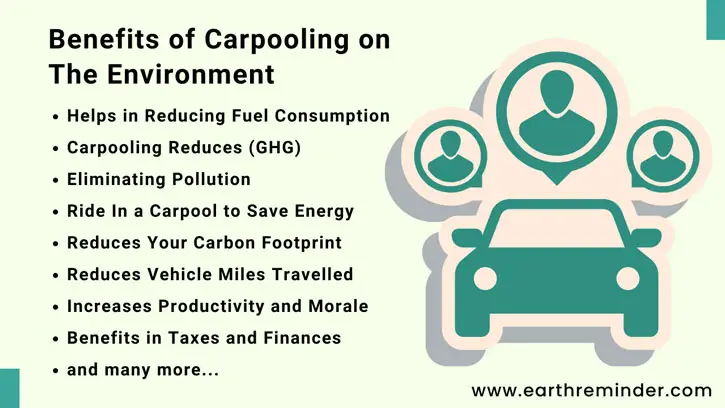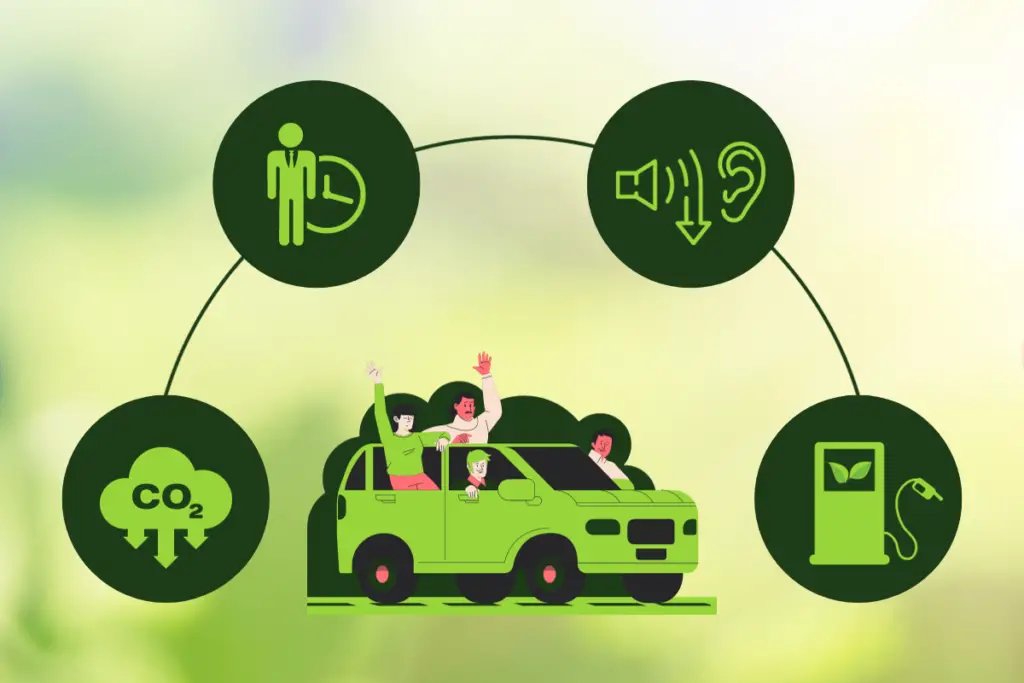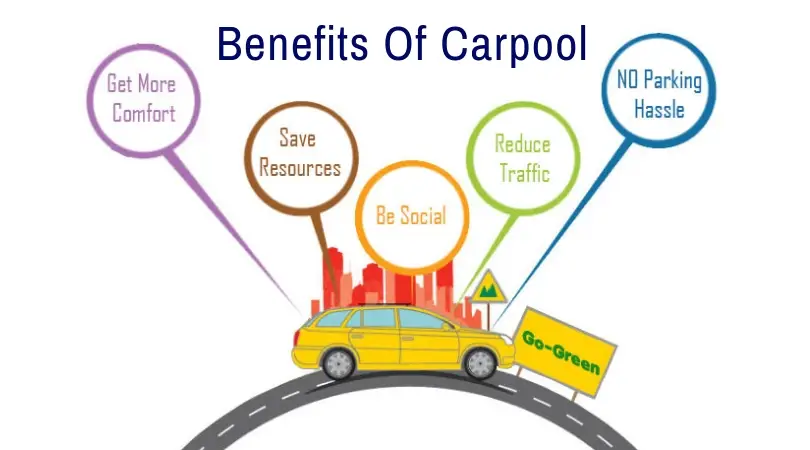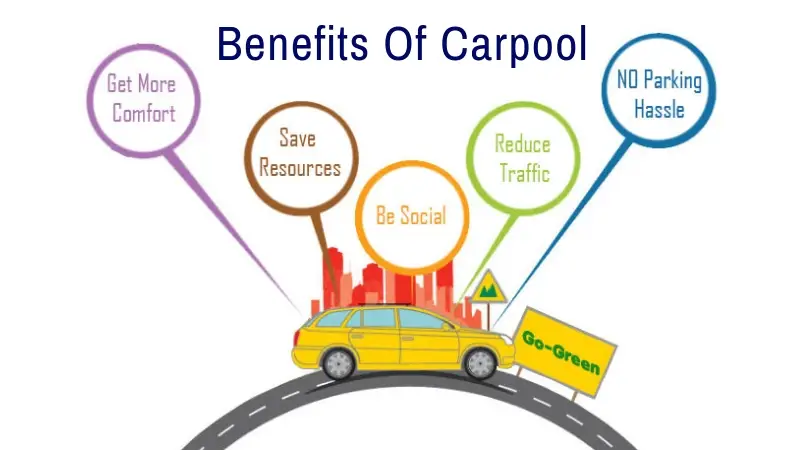Imagine a world where traffic congestion is reduced, air pollution is minimized, and friendships are strengthened, all while saving money on gas and parking. This is not just a dream, but a reality that can be achieved through the simple act of carpooling. Carpooling, or sharing rides with others who have similar destinations, has countless benefits for both individuals and the planet. From reducing carbon emissions to easing the burden on overcrowded roads, carpooling presents a simple yet effective solution for a greener future. In this article, we will explore the various advantages of carpooling and discover how this small change in your daily routine can have a significant impact on the environment. So buckle up and let’s hit the road towards a more sustainable future!
Reducing Traffic Congestion

Sharing Rides to Decrease the Number of Vehicles on the Road
One of the key advantages of carpooling is its ability to reduce traffic congestion. By sharing rides, you can help decrease the number of vehicles on the road during peak hours. This means less traffic and faster commute times for everyone involved. By coordinating schedules and finding compatible carpool partners, you can effectively contribute to alleviating the congestion on our roads.
Promoting Carpooling as a Solution for Rush Hour Traffic
Rush hour traffic can be particularly stressful and time-consuming. However, by promoting carpooling as a solution for rush hour traffic, we can make a significant impact on reducing the congestion during these peak hours. Encouraging individuals to share rides during busy periods can help distribute the number of vehicles on the road more evenly, resulting in smoother traffic flow and less frustration for commuters.
Utilizing Carpool Lanes for Faster Commutes
Many cities have designated carpool lanes or High Occupancy Vehicle (HOV) lanes to incentivize carpooling. These lanes are typically reserved for vehicles with multiple occupants, allowing them to bypass the regular traffic flow and enjoy faster commutes. By utilizing carpool lanes, you not only save time but also contribute to reducing traffic congestion on the main lanes, benefiting both carpoolers and individual drivers.
Lowering Emissions and Air Pollution
Carpooling to Minimize Carbon Footprint
Carpooling is an effective way to minimize your carbon footprint. By sharing rides, you can significantly reduce the number of vehicles on the road, leading to lower greenhouse gas emissions. With fewer cars emitting harmful pollutants into the atmosphere, we can help combat climate change and improve air quality for a greener future.
Reducing Vehicle Emissions through Ridesharing
When multiple individuals carpool together, it naturally leads to a reduction in vehicle emissions. By consolidating trips, carpooling allows for more efficient use of vehicles, resulting in lower emissions per person. This collective effort to minimize the environmental impact of transportation is crucial for reducing air pollution and striving for a more sustainable future.
Enhancing Air Quality by Sharing Rides
Air pollution is a pressing concern, particularly in urban areas. Carpooling offers a practical solution to enhance air quality by reducing the number of cars on the road and, consequently, the amount of pollutants released into the atmosphere. By opting for shared rides, you actively contribute to cleaner air and a healthier environment for everyone.
Saving Money on Transportation

Pooling Resources for Cost-Effective Commutes
Carpooling allows for pooling resources, making commutes more cost-effective. By sharing the costs of fuel and tolls with your carpool partners, you can save a significant amount of money on transportation expenses. Additionally, carpoolers can benefit from lower maintenance and parking costs as they have fewer miles to cover and fewer individual vehicles to maintain.
Splitting Fuel and Toll Expenses to Reduce Financial Burden
Fuel and toll expenses can quickly add up, especially if you have to commute long distances regularly. Carpooling provides a way to alleviate this financial burden by allowing you to split these expenses among multiple individuals. By dividing the costs, you can significantly reduce your overall transportation expenditure, making carpooling a budget-friendly option.
Utilizing Carpooling as a Strategy for Budget-Friendly Travel
For those looking to save money on their travel expenses, carpooling is an excellent strategy. Whether commuting to work or embarking on a long-distance trip, sharing rides with others allows you to divide the costs and make your travel more affordable. With rising fuel prices and the increasing cost of owning a vehicle, carpooling presents an attractive alternative that can help you effectively manage your budget.
Building Social Connections
Creating Opportunities for Networking and Friendships
Carpooling provides a unique opportunity to create connections and build relationships with your fellow passengers. Sharing rides regularly allows for conversations and camaraderie during your commutes, opening doors to new friendships or networking opportunities. Carpooling offers a chance to connect with individuals you may not have otherwise met, fostering a sense of community and enhancing your social interactions.
Fostering a Sense of Community among Carpoolers
Carpooling creates a sense of community by bringing people together for a shared purpose: to reach their destinations conveniently and sustainably. Sharing the road with others encourages cooperation, teamwork, and a supportive environment. Whether you’re forming bonds with coworkers, neighbors, or fellow students, carpooling fosters a sense of togetherness and strengthens the social fabric within your community.
Enjoying Shared Experiences and Conversations during Rides
Sharing rides can turn your daily commute or long trips into enjoyable experiences. Engaging in conversations, sharing stories, or simply enjoying the company of your fellow carpoolers can make the journey more pleasant. From discussing current events to telling anecdotes, the shared experiences during carpooling create a positive and engaging environment that enhances your overall travel experience.
Improving Overall Road Safety

Reducing the Number of Vehicles on the Road for Safer Commutes
One of the significant advantages of carpooling is its contribution to improving overall road safety. By reducing the number of vehicles on the road, carpooling helps minimize congestion and the likelihood of accidents. With fewer cars jostling for space, there is more room for maneuvering, decreasing the risk of collisions and creating a safer commuting environment for all road users.
Sharing Rides to Decrease the Risk of Accidents
Carpooling inherently decreases the risk of accidents by decreasing the number of cars on the road. When individuals share rides, there is a reduced chance for reckless driving or traffic violations, leading to a safer journey for everyone involved. By actively participating in carpooling, you contribute to a culture of responsible driving and promote safer roads.
Promoting Responsible Driving Behavior through Carpooling
Carpooling serves as a platform to promote responsible driving behavior. When you share rides with others, it encourages you to be more mindful of traffic rules, speed limits, and general road etiquette. By being accountable to your carpool partners, you prioritize safety and promote responsible driving habits, benefiting not only yourself but also the overall road safety.
Reducing Dependence on Fossil Fuels

Transitioning from Single Occupancy Vehicles to Shared Rides
Carpooling offers an effective way to reduce our dependence on fossil fuels by transitioning from single occupancy vehicles to shared rides. By sharing cars, we can significantly decrease the overall fuel consumption and, consequently, the demand for oil and gasoline. This shift towards shared transportation is crucial for promoting sustainable practices and reducing our reliance on finite fossil fuel resources.
Promoting the Use of Eco-Friendly Vehicles in Carpooling
In addition to sharing rides, carpooling can further contribute to reducing dependence on fossil fuels by promoting the use of eco-friendly vehicles. Encouraging participants to choose electric or hybrid cars for their shared journeys helps decrease carbon emissions and supports the adoption of sustainable transportation alternatives. By embracing greener vehicle options in carpooling, we take a step closer to a more environmentally friendly future.
Decreasing Reliance on Oil and Gasoline through Ridesharing
Ridesharing services, including carpooling, help decrease our reliance on oil and gasoline by reducing the number of individual vehicles on the road. As more people opt for shared rides, the collective impact of decreased fuel consumption becomes significant. This reduction in fuel usage plays a vital role in safeguarding our natural resources, minimizing environmental pollution, and promoting a greener future for generations to come.
Addressing Parking Challenges
Reducing the Need for Parking Spaces through Carpooling
Parking spaces are often limited in urban areas, leading to parking shortages and the need for expensive parking structures. Carpooling directly addresses this challenge by reducing the number of vehicles on the road, subsequently decreasing the demand for parking spaces. By choosing to share rides with others, you contribute to the efficient use of existing parking facilities and help alleviate parking-related issues in congested city centers.
Utilizing Carpooling to Solve Parking Shortages in Urban Areas
Carpooling presents a viable solution to the parking shortages faced in many urban areas. Collaborating with fellow commuters to share rides helps free up parking spaces, reducing the strain on already limited parking facilities. By actively participating in carpooling, you not only make your own commute more convenient but also assist in addressing the parking challenges faced by cities worldwide.
Encouraging Efficient Use of Parking Facilities through Ridesharing
Carpooling encourages the efficient use of parking facilities by maximizing the occupancy of vehicles. With multiple individuals sharing a single car, you decrease the number of cars occupying parking spaces, allowing more people to utilize the limited available facilities. By opting for carpooling, you contribute to the effective utilization of parking resources, making them more accessible for others while reducing the need for additional parking infrastructure.
Increasing Mobility Options
Expanding Access to Transportation for Individuals without Vehicles
For those without access to personal vehicles, carpooling offers an invaluable mobility option. By participating in carpooling arrangements, individuals can benefit from the convenience and accessibility of shared rides. Carpooling opens up transportation opportunities for individuals who may otherwise face challenges in reaching their destinations, enhancing mobility options and fostering inclusivity within communities.
Enhancing Mobility for People with Limited Mobility Options
Carpooling also enhances mobility for individuals who may have limited transportation options due to physical disabilities or other mobility constraints. By pooling resources and sharing rides, carpooling offers a more accessible and accommodating means of transportation for people with specialized needs. This inclusivity ensures that everyone can enjoy the benefits of reliable and convenient mobility, regardless of individual circumstances.
Providing Alternative Transportation Solutions through Carpooling
Carpooling provides alternative transportation solutions that complement existing public transportation networks. By integrating carpooling into our mobility options, we can bridge gaps in public transportation coverage, especially in areas with limited bus or train services. This combined approach offers individuals more flexibility and choice in reaching their destinations, ultimately improving the overall accessibility of transportation for the entire community.
Promoting Energy Conservation
Conserving Energy Resources by Sharing Rides
Energy conservation is a critical component of promoting sustainability. Carpooling effectively contributes to energy conservation by reducing the overall energy consumption of transportation. With fewer vehicles on the road, we decrease the demand for fuel and other energy resources, minimizing our ecological footprint and preserving valuable energy resources for future generations.
Reducing the Overall Energy Consumption of Transportation
Transportation accounts for a significant portion of our energy consumption. By actively participating in carpooling, we can collectively reduce the overall energy consumed in transportation. Sharing rides ensures that vehicles are used more efficiently, decreasing the number of cars on the road and optimizing energy usage. This commitment to conservation plays a crucial role in sustainability efforts and helps secure a greener future.
Advancing Sustainable Practices through Carpooling
Carpooling serves as a vehicle for advancing sustainable practices on multiple fronts. By encouraging shared rides, carpooling promotes responsible resource management, emission reduction, and energy conservation. It fosters a culture of sustainability by actively engaging individuals in environmentally friendly transportation solutions. Through carpooling, we can collectively contribute to a more sustainable future and preserve our planet’s resources for generations to come.
Government Support and Incentives
Implementing Policies to Promote and Encourage Carpooling
Government support plays a vital role in promoting and encouraging carpooling as an attractive transportation option. By implementing policies that incentivize and emphasize the benefits of carpooling, governments can encourage individuals and communities to actively participate in shared rides. This support can come in the form of dedicated carpool lanes, financial incentives, or educational campaigns, all geared towards maximizing the adoption of carpooling for a greener future.
Offering Tax Incentives for Carpoolers
Tax incentives serve as a powerful tool to incentivize carpooling and encourage its adoption. Governments can offer tax benefits or credits to individuals who actively participate in carpooling arrangements, providing a financial incentive for shared rides. These incentives not only make carpooling more financially attractive but also contribute to reducing traffic congestion, emissions, and energy consumption, aligning with the government’s sustainability goals.
Investing in Carpooling Infrastructure and Initiatives
Government investments in carpooling infrastructure and initiatives are crucial for the success and widespread adoption of carpooling. This support can take various forms, such as developing dedicated carpool lanes, improving ride-sharing platforms, or establishing carpooling information centers. By investing in the necessary infrastructure and initiatives, governments can create an enabling environment that fosters the growth of carpooling and encourages individuals to embrace shared rides as a sustainable transportation option.
In conclusion, carpooling offers numerous benefits that extend beyond individual convenience. By reducing traffic congestion, lowering emissions, saving money, building social connections, improving road safety, decreasing reliance on fossil fuels, addressing parking challenges, increasing mobility options, promoting energy conservation, and garnering government support, carpooling plays a pivotal role in achieving a greener and more sustainable future. By actively participating in carpooling and encouraging others to do the same, we can make a significant impact on our environment, our communities, and our quality of life. Let’s embrace the power of shared rides and work towards a more sustainable tomorrow.


